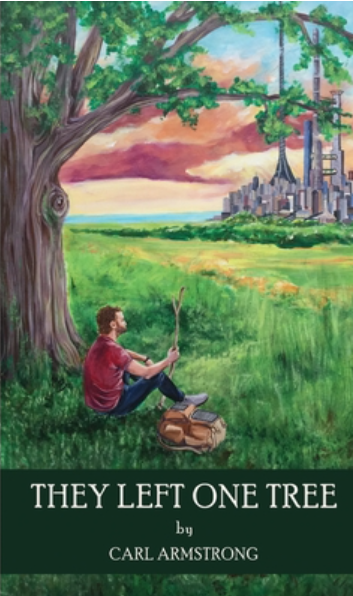Editorial Review
"Praise for 'They Left One Tree'
When a story really sucks me in, it's typically sparked by an infatuation with the setting. It's that intense yearning to stroll through the halls of Hogwarts, or to come around the bend and spot Rivendell for the first time. I didn't expect that feeling when I picked up They Left One Tree, yet I found myself considering whether I should re-read the book shortly after I'd finished it, just to return to the scene again.
The place isn't some far-off fantasy land: It's the U.S., and it's 500 years in a surprisingly plausible future. But unlike the other works I've encountered that imagine a world with a changed climate, debut author Carl Armstrong's America isn't a place of destruction and despair. The path to this future may have been rocky, but people seem to be getting by fine with new technology. Humans have congregated in giant mega-cities, leaving the rest of the landscape open for carbon-eating tech and, most important of all, active rewilding.
We first meet Jack Wilson as a child the night his backyard forest, Chicago's last, is cut down. Fast forwarding 28 years to the present, we see Jack in his current life, an astrobiology professor about to embark on an anniversary vacation with a rather disagreeable wife. By the time he's pulled away — rescued? — by some urgent news from work, the reader is perhaps as relieved to leave her behind as Jack is. Our story follows the academic on a journey that takes him out of the big city — with its green roofs and personal computers in contact lenses — and out into these wilds, a place where no person has set foot for generations.
It's nature as nature once was, but the way Armstrong paints the scene, it feels as much like a fantasy land as it does an Aldo Leopold narrative. It's a portrayal our native landscapes have always deserved, with the grandeur encouraged by fiction and the ecological accuracy of non-fiction. And it's a landscape sprinkled with the intrigue of ancient ruins which, as it were, reveal what may one day remain of our society as we know it today.
What brings Jack outside the city limits, and what he encounters on his journey, were such delightful surprises that I dare not reveal them here. The book is an easy read I'd recommend to anyone, but I'm most excited of all to share it with people like me: People who appreciate our natural world, have a strong sense of adventure, and are eager to experience a future that leaves them filled with optimism.
—
Anna Funk, Ph.D. is a restoration ecologist turned science
communicator based in Kansas City, MO. Find her at itsdrfunk.com
Carl Armstrong lives and works in the suburbs of Chicago, Illinois. When not moonlighting as an author, he teaches high school science. Frequent trips to prairies and forests with a dog, a thermos, and a camera are par for the course. Occasional twenty- or thirty- mile bike rides aren't out of the question when it's warm out.


